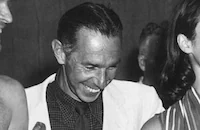Boss

Brief Synopsis
Cast & Crew
Jack Arnold
Fred Williamson
D'urville Martin
R. G. Armstrong
Leo Petrie
Kip Allen
Film Details
Technical Specs
Synopsis
Two African American bounty hunters who are chasing an outlaw ride into a small town. Finding that the town has no sheriff, they take over the job themselves, against the will of the mostly white citizens. As they wait to get their man, they create all kinds of trouble for the townsfolk.
Director

Jack Arnold
Cast
Fred Williamson

D'urville Martin
R. G. Armstrong
Leo Petrie
Kip Allen
Ben Zeller
Paul Conlan
Otis Lewellen
Hardy Phelps
George Oja
Mike Eiland
Bruce Gordon
Mark Brito
Barbara Leigh
Elizabeth Saxon
Luke Jones
V Phipps-wilson
Sonny Cooper
Don Hawn
Phil Mead
Dickson Newberry
Judson Kane
Carmen Hayworth
Harry Luck
Wayne Waterhouse
Lou Brito

Joe Alfasa
Sonny Robbins
Paul Barby

Donald Barry
Don Hayes
William Smith
Carmen Zapata
Joe Kurtzo
Jonathan Bahnks
Crew
Jack Arnold
Don Call
Dwight Call
Bob Caramico
Norval Crutcher
Jack Debrun
Ted Gomillion
Leon Moore
Leon Moore
Tom Nixon
Tom Nixon
Robert E Reed
Eva Ruggiero
Gene Ruggiero
Myrl A Schreibman
Mike Terry
Fred Williamson
Fred Williamson
Lee Winkler
Film Details
Technical Specs
Articles
Boss - Boss
Originally rolled out under the far less politically correct title of Boss N-gger, Boss casts Williamson in the title role of a comic western that brings the concept of a black western (which had been around for decades) into the '70s with plenty of panache and enough violence and mayhem to push the PG rating to its limit. The gist of the story involves Boss and his cohort, Amos (frequent Williamson costar D'Urville Martin, who starred in and directed the immortal Dolemite the same year) as bounty hunters taking over as the law in a small town where their latest quarry is hiding. Among their edicts is the banning of the racial epithet in the title, which is still uttered dozens of times more than in Blazing Saddles.
Williamson's desire to go indie results in a winning film that earned very positive notices from critics and audiences at the time, with Vincent Canby's New York Times review noting, "Unlike most leading actors, black or white, Mr. Williamson seems to possess a genuine sense of humor that hasn't yet been systematized--like Burt Reynolds's--as part of a public personality. I have no idea whether Mr. Williamson is witty or not, though his movie is." The film's success kicked off an impressive streak of projects after Williamson's final film for American International Pictures that same year, Bucktown. The following year he would write, direct, and star in the far more obscure western comedy Adiós Amigo with Richard Pryor and James Brown, the private eye crime film No Way Back, and the 1977 actioner Mr. Mean, while he would simply write and star in such titles as another, rougher western, Joshua (1976).
If that weren't enough, Williamson also directed and starred in films for his own Po' Boy Productions including 1976's Death Journey and Mean Johnny Barrows, a double bill that remains popular today on home video. The former professional football player for the Oakland Raiders, Kansas City Chiefs, and Pittsburgh Steelers has remained in steady demand to the present day, turning up in everything from Robert Rodriguez's From Dusk Till Dawn to Starsky & Hutch (2004).
Fortunately the joys of this film extend beyond Williamson's trademark rakish, cigar-chomping persona. The cast is stacked with colorful character actors including reliable tough guys like R.G. Armstrong (Predator), who reteamed with Williamson in Mean Johnny Barrows., and western serial actor Don "Red" Barry, who had largely switched over to TV roles by this point but also made time to appear in Al Adamson's Blazing Stewardesses the same year. Cast as the nominal female leads here are Barbara Leigh, a Georgia-born actress best known for Sam Peckinpah's Junior Bonner (1972) and the drive-in dystopia of Terminal Island (1973), and future producer Carmen Hayward, making her debut here before moving on to Cheerleaders' Wild Weekend (1979) and, oddly enough, the 1991 version of Father of the Bride. Of course, the most familiar face here for drive-in buffs will be William Smith, the ultimate '70s movie tough guy, who made his name on TV's Hawaii Five-O before moving on to a string of biker films (with no less than three in 1970 including C.C. and Company, Angels Die Hard, and Nam's Angels) and juicy supporting roles in John Milius's Conan the Barbarian (1982), as Conan's dad no less, and Red Dawn (1984).
However, the most surprising name associated with this film has to be its director, Jack Arnold, a name familiar to any '50s monster movie fan. This turned out to be the penultimate big screen credit for the filmmaker, who was best known for his string of creature feature hits at Universal like It Came from Outer Space (1953), Creature from the Black Lagoon (1954), Tarantula (1955), and The Incredible Shrinking Man (1957). Of course, he had already proven his ability to adapt with the demands of mainstream comedy thanks to The Mouse That Roared (1959) and B-movie thrills courtesy of High School Confidential! (1958), so his move into Fred Williamson territory with this and the previous Black Eye (1974) can be best enjoyed as another delightful turn in a career that moved through the Hollywood movie maze unlike other.
By Nathaniel Thompson

Boss - Boss
Quotes
Trivia
Miscellaneous Notes
Released in United States 1975
Released in United States on Video October 21, 2008
Todd-AO 35
Released in United States 1975
Released in United States on Video October 21, 2008













